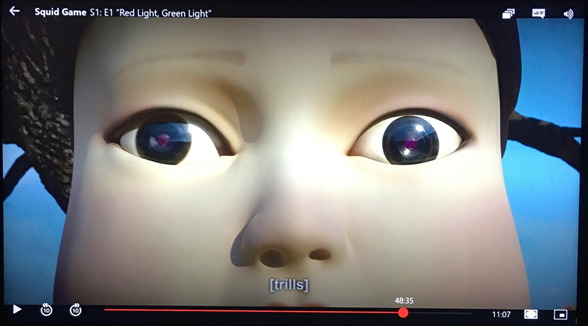
In today’s video-rich global social media and streaming environment, the use of subtitles and closed captions has come to center stage. This week, news agencies and the Twitterverse alike reported that subtitles and closed captions for the hugely popular Korean-language series, Squid Game, did not accurately reflect the dialogue being spoken on screen.
This recent controversy brings up the opportunity to take a deep dive into the distinctions between subtitles and closed captions and how they can impact the user’s experience. People often think of subtitles and closed captioning as roughly the same thing and serving the same function. The reality is that, while there may be some overlap in functionality, there are several important distinctions.
Subtitling vs. Closed Captioning
Basically, both closed captions and subtitles involve capturing the dialogue in an audiovisual medium and transferring it to the written word. Both provide the dialogue somewhere on the screen to be read simultaneously with the lines being delivered, and the purpose of both is to aid the viewer to understand the dialogue.
Closed captioning is associated with use by the deaf and hard of hearing. It is considered an accommodation and can be turned on or off, depending on the preference of the viewer. Unlike subtitles, the assumption with closed captioning is that the viewer cannot hear the audio and needs not only the spoken word, but also other information related to the soundtrack of the piece. For example, if someone off-screen says something, or it is difficult to discern visually who is speaking each line, closed captioning will add the character’s name in front of the line of dialogue, so a person who is deaf or hard of hearing can tell who spoke the line. Further, because sounds in films often carry meaning, closed captioning provides descriptions of relevant sounds, from [ominous steps] to [EXPLOSION] to [silenced gunshot].
Closed captioning of television programs (live or pre-recorded) is required by law in the United States for programming regulated by the Federal Communications Commission (FCC) to guarantee quality and availability, while subtitling is generally not. Further, closed captioning for movies in U.S. theaters is covered by the Americans with Disabilities Act (ADA) and since 2017, all theaters are legally required to provide closed captioning through caption devices for all digital films that are produced with captions. In contrast, subtitles are provided for convenience only―as it is assumed the viewer can hear the soundtrack, and are largely unregulated. It is important to note that subtitles are not considered an acceptable substitute for closed captioning.
Streaming Services
When it comes to streaming services and online content, things become a bit more interesting. While not legally required, more and more of the major streaming services, including Netflix, are requiring that content come with closed captioning and subtitles. Why? It’s simply good business. Providing closed captioning creates an inclusive environment for deaf and hard of hearing viewers. Subtitles, such as those at issue in Squid Game are unregulated and are largely provided to translate the foreign-language dialogue on the screen for viewers who can hear the audio. But subtitles also increase the content available to viewers both in the U.S. and abroad, regardless of their native language; meaning, there is a commercial-use case for having both subtitles and closed captioning. While generally Netflix does not bear this cost, they require it for the media they stream.
Similarly, YouTube has gone to great lengths to facilitate closed captioning and subtitling of the content provided over their platform. This is not only an attempt to be more inclusive, but also to increase the number of viewers and provide additional functionality to their platform (e.g., ability to consume videos in loud environments) over mobile devices. Google has even provided free automated closed captioning via voice recognition for its video conferencing service.
At Trusted Translations, we have experts in closed captioning and 508 compliance, as well as subtitling to and from over 200 languages. Experience has shown us that the drama surrounding Squid Game English-language subtitles and closed captions, which differ from both the Korean-language soundtrack and the English-language dubbed soundtrack, is not unexpected and highlights the impact of subtitles and captions on viewership and accessibility. An accurate transcription and translation of a work for subtitling and closed captioning can enhance the viewer experience and increase the market for the content. Inaccuracies, on the other hand, can detract from the success of even the highest quality material.

